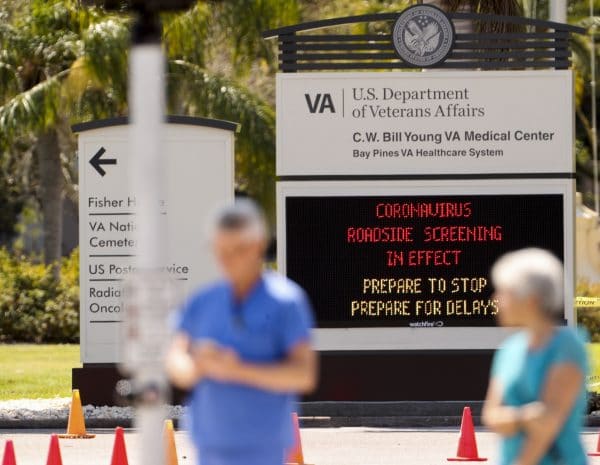Health care workers fighting the coronavirus pandemic are sounding alarms about a shortage of staffing, equipment and supplies.
Now, government inspectors have confirmed that the problem has spread to medical centers serving the nation’s veterans, including the Bay Pines VA Healthcare System in St. Petersburg and the James A. Haley Veterans’ Hospital in Tampa.
Leaders at the two centers reported concerns about having enough COVID-19 testing supplies and personal protective equipment for staff, according to a study conducted March 19-24 by the Office of Inspector General with the Department of Veterans Affairs.
Bay Pines lacks in nursing staff, protective N95 masks, blood bank supplies and housekeeping management, the study says, while Haley has inadequate supplies of N95 masks, testing reagents, swabs, surgical masks, face shields and surgical gowns.

Screening for coronavirus is underway for patients, visitors and staff at Bay Pines VA Healthcare System. A government report says the medical center in St. Petersburg lacks the materials it needs to deal with the disease.
(CHRIS URSO/Tampa Bay Times/TNS)
The findings bear out the experience of one Haley patient, Air Force Maj. Ed Gilchrist, who is receiving treatment in the spinal cord injury unit.
Gilchrist, 37, said he hears concerns among nurses about protective equipment and how they’ll keep themselves, their patients and their families safe. What’s more, he’s about loosening what started out as strict screening of visitors to prevent the spread of the virus at the Tampa hospital.
“Their response has been a bit disjointed,” Gilchrist said.
The inspector general’s report comes even as the Department of Veterans Affairs is offering to extend its services to help fill gaps in civilian health care. In one example, the department opened 50 beds Sunday in New York City to patients who are not veterans and who aren’t undergoing treatment for COVID-19.
The latest figures show what’s at stake for veterans: As of Tuesday, the department reported 1,347 confirmed cases of COVID-19, including one inpatient and three outpatients in Bay Pines and three outpatients in Tampa. Forty-one veterans have died systemwide — a number that doubled overnight. Most were over 60.
In emails to the Times this week, Bay Pines and James Haley insisted they have what they need to care for patients — “enough essential COVID-related items and supplies to protect patients and staff in accordance with CDC guidelines.”
Since the release of the inspector general’s report, Bay Pines has hired 22 nursing assistants, registered nurses and medical support assistants, with 28 more in the process of coming on board, spokeswoman Selina Meiners said.
In response to the outbreak of the coronavirus, veterans’ medical centers including Bay Pines and James Haley have restricted visitation and shifted appointments to telehealth services.
Visitors are generally only allowed if they have medical power of attorneys, are healthcare proxies or healthcare surrogates, caregivers needed for transportation, or if a patient is near death. All patients, employees, and visitors must undergo screening for coronavirus.
In a joint letter, the directors of both local veterans’ medical centers acknowledged that the changes concern everyone who has business with them.
“Our plans are not perfect, and we will continue to confront challenges,” the letter said.
“Please know we are working very hard to mitigate stress and inconvenience. However, the decisions we have made and will continue to make are all efforts to protect you.”
Another change under consideration locally and nationwide: Splitting inpatient units into one for staff and coronavirus patients and one for all other patients.
William Dumas, 68, a Marine veteran from Wesley Chapel, had an acupuncture pain-relief session canceled because of the new department guidelines. The treatment was deemed non-essential, he said.
The suffering doesn’t wait, though, so Dumas has to rely on medication for relief.
“A lot of people are going to be in pain,” he said.
Dumas said he wishes the department had given more thought to alternative ways of treating patients like him to avoid an influx of patients at its medical centers and clinics.
One veterans group said it wishes the department had been more forthcoming earlier about how it would deal with the coronavirus.
“The department and the secretary have lagged in their responses,” Jeremy Butler, chief executive of the Iraq and Afghanistan Veterans of America in New York said in a statement.
Butler said it took more than two weeks after the pandemic was declared to get information he could communicate with the organization’s 400,000 members.
Leaders of the American Legion and the Veterans of Foreign Wars have also called for transparency by the department so they can help dispel misinformation and keep veterans updated on news they can use.
Finally, on March 27, a day after the inspector general’s report, the Department of Veterans Affairs released its national COVID-19 response plan for review and feedback.
The department is moving in the right direction now, Butler said, including weekly call-ins with veterans groups like his by Secretary Robert Wilkie. Still, he said, he’d like to see Department of Veterans Affairs leaders more involved in President Trump’s coronavirus briefings.
___
© 2020 the Tampa Bay Times
Distributed by Tribune Content Agency, LLC.



